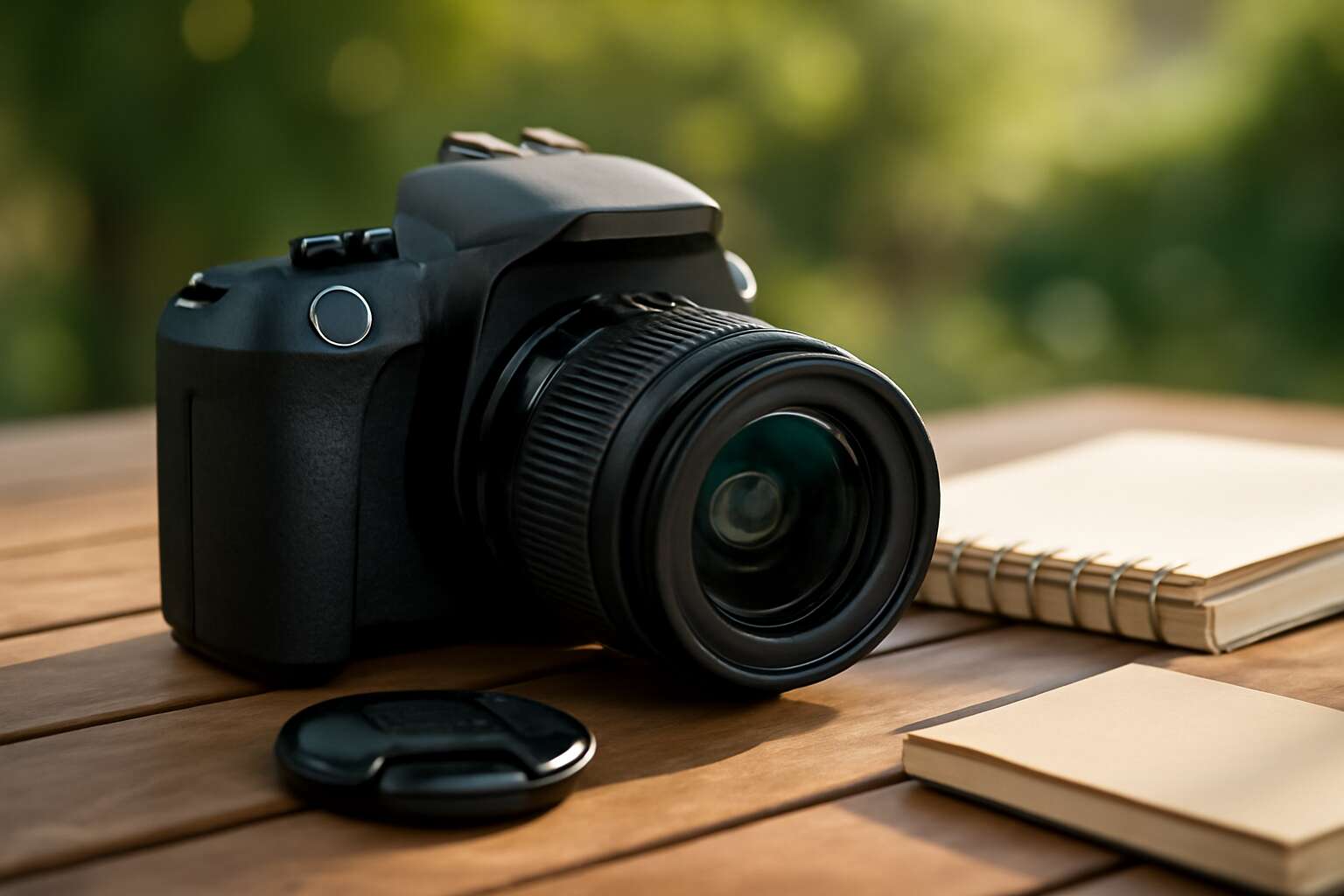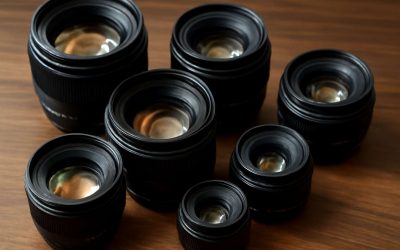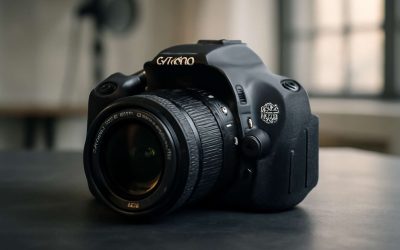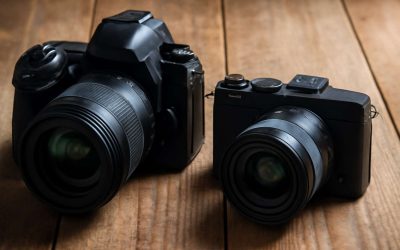Understanding DSLR Cameras for Beginners
What Is a DSLR Camera?
In a world where every fleeting moment can be transformed into an enduring masterpiece, understanding what DSLR camera is best for beginners becomes an essential quest. These cameras are not merely devices; they are gateways into a realm where light dances and shadows whisper stories. A DSLR, or digital single-lens reflex camera, offers an extraordinary blend of simplicity and sophistication, making it the ideal starting point for newcomers eager to explore their creative potential.
Unlike compact cameras, DSLRs boast interchangeable lenses and superior sensor technology, unlocking a universe of photographic possibilities. For those embarking on their journey, it’s helpful to consider key features such as size, weight, and user interface. To aid your decision, here is a small guide to what makes a DSLR perfect for beginners:
- Ease of use with intuitive controls
- Affordability without sacrificing essential functionalities
- Robust build quality for longevity
- Guided modes and automatic settings to learn the craft gradually
As you embark on your photographic odyssey, remember that choosing the right DSLR for beginners can ignite a passion that lasts a lifetime, transforming simple snapshots into timeless art.
Key Features to Consider
Understanding the core features of DSLR cameras is essential when contemplating what DSLR camera is best for beginners. These devices serve as a bridge between simplicity and creative mastery, demanding an appreciation for their nuanced capabilities. At the heart of this exploration lies the significance of intuitive controls—buttons and dials designed not merely for function but for fostering confidence in new users. The tactile experience of adjusting aperture, shutter speed, or ISO should feel almost instinctive, creating a seamless dialogue between the photographer and their subject.
Moreover, affordability remains a crucial consideration. Many entry-level models strike a delicate balance, offering essential functionalities without the prohibitive price tag that often accompanies professional-grade equipment. Durability is another attribute to seek—robust build quality ensures your investment endures the rigours of learning and experimentation. To simplify the learning curve, look for cameras with guided modes and automatic settings, which act as gentle mentors in the early stages of photographic discovery.
Ultimately, choosing what DSLR camera is best for beginners hinges on recognising these key features—each an invitation to delve deeper into the art of capturing moments that transcend mere imagery, transforming them into evocative stories told through light and shadow.
Benefits of Choosing a DSLR as a Beginner
Opting for a DSLR as a beginner isn’t just a nostalgic nod to photography’s golden age; it’s a strategic move to elevate your visual storytelling. With their larger sensors and manual controls, DSLR cameras offer a level of creative freedom that point-and-shoots simply can’t match. Plus, they foster a deeper understanding of the fundamentals—like how aperture and shutter speed dance together to produce that perfect shot. It’s like learning to play an instrument: the more you understand the mechanics, the more expressive your art becomes.
Choosing what DSLR camera is best for beginners isn’t just about flashy features; it’s about investing in a device that grows with your skills. Many models come equipped with guided modes, providing a gentle onboarding into the complex world of photography. And let’s not forget the tactile pleasure of manual dials and buttons—because adjusting settings should feel like wielding a magic wand, not deciphering alien hieroglyphs.
To simplify your journey, here’s a quick rundown—an ordered list of what to look for:
- Ease of use with intuitive controls
- Affordable price point without sacrificing essential features
- Durability to withstand the rigours of learning
- Guided modes that act as friendly mentors
All these elements make the quest to find the perfect “what dslr camera is best for beginners” an exciting adventure—one where every shot is a step closer to mastering the art of capturing moments that transcend mere imagery. Because at its core, a DSLR isn’t just a camera; it’s a passport to a world of endless creativity and discovery.
Top Factors to Consider When Selecting a Beginner DSLR
Budget and Price Range
Choosing the right DSLR camera as a beginner can feel a bit like navigating a maze blindfolded—there’s plenty of options, but which one truly stands out? Budget and price range are the first stops on this journey. After all, there’s no need to break the bank when you’re just starting out, but skimping too much can leave you frustrated with subpar features.
The sweet spot often lies in balancing affordability with essential features, such as image quality, ease of use, and compatibility with future upgrades. Consider the following:
- How much are you willing to spend? There’s a wide spectrum, from entry-level models to more advanced options that won’t leave your wallet weeping.
- Does the camera offer intuitive controls suitable for beginners? If it’s overly complicated, you might lose interest faster than you can say “auto mode”.
- Are there ample lens options and accessories within your price range? Because, let’s be honest, we all dream of that perfect bokeh shot!
Remember, the best choice for what DSLR camera is best for beginners hinges on finding a model that aligns with your budget without sacrificing vital features—think of it as a harmonious dance between cost and capability.
Ease of Use and User Interface
When embarking on the journey to find the perfect what DSLR camera is best for beginners, ease of use and a friendly user interface often tip the scales. A beginner-friendly DSLR should feel less like deciphering an ancient script and more like engaging in a dance with your camera—fluid, intuitive, and inspiring. If the controls are overly complex or the menus labyrinthine, even the most enthusiastic novice might find their passion waning faster than a fleeting sunset.
Thankfully, many beginner models boast a simplified layout, with clearly labelled buttons and a straightforward mode dial. Some cameras even feature guides and automatic modes that gently introduce newcomers to advanced settings without overwhelming them. Consider exploring options with tactile, responsive controls that make every adjustment feel like a brushstroke—small yet profoundly impactful.
To further refine your choice, look for cameras that offer a well-organised menu system and easy access to essential features. This ensures that as your skills grow, your camera remains a loyal companion, not a barrier. Remember, the what DSLR camera is best for beginners is ultimately the one that feels like an extension of your creativity, not a puzzle waiting to be solved.
Image Quality and Sensor Size
Image quality remains the cornerstone of any compelling photograph, especially for those embarking on their photographic journey. When considering what DSLR camera is best for beginners, sensor size and overall image fidelity emerge as vital factors that can make or break your creative pursuits. Larger sensors tend to excel in low-light conditions, rendering richer colours and finer detail, which can elevate your images beyond mere snapshots into genuine works of art. Conversely, smaller sensors, while more budget-friendly, may lack the depth and dynamic range that truly captures the essence of a scene.
To navigate this subtle but crucial landscape, it’s worth paying close attention to sensor specifications. A beginner-friendly DSLR should offer a sensor that balances quality with ease of use, enabling you to experiment without feeling overwhelmed by technical complexity. Some models feature APS-C sensors, which strike an elegant equilibrium—offering impressive image quality without the hefty price tag. As you grow more confident, the sensor’s capabilities will seamlessly support your expanding creative ambitions, making your choice of what dslr camera is best for beginners a pivotal step in your visual storytelling journey.
Lens Compatibility and Availability
Choosing the right lens for a beginner DSLR is akin to selecting a brush for an aspiring artist—each choice influences the final masterpiece. Compatibility is paramount; not all lenses fit every DSLR model, so understanding the mount system is crucial. A lens that is readily available and versatile can open a world of creative possibilities, transforming your initial curiosity into a profound passion.
For those pondering what dslr camera is best for beginners, prioritising lens compatibility ensures your investment remains future-proof. Look for models that support a range of lenses, particularly those offering macro, wide-angle, and telephoto options. This flexibility allows you to experiment with different styles and genres without constantly upgrading your gear. Remember, the best DSLR for beginners isn’t just about the camera body but also about how seamlessly your lenses can adapt to your evolving vision.
- Availability of lenses in your local market or online stores
- Compatibility with standard lens mounts like Canon EF or Nikon F
- Range of focal lengths suited to different photography styles
Size, Weight, and Portability
Size, weight, and portability are often overlooked but are crucial when choosing what DSLR camera is best for beginners. A bulky, heavy model can quickly become a burden, especially if you plan to carry it around for extended periods. Compact designs with lightweight frames make capturing spontaneous moments more practical and enjoyable. Remember, a camera that’s too heavy may discourage frequent use, stalling your creative growth.
Consider your typical photography environment. Will you be travelling, hiking, or shooting at events? For these scenarios, a lightweight, portable DSLR is ideal. Some models strike a perfect balance—small enough to fit in your bag but still offering advanced features. The right size and weight can boost your confidence and encourage regular practice, making your journey into photography more seamless and rewarding.
Additional Features (Video Capabilities, Wi-Fi, etc.)
When hunting for the best beginner DSLR, it’s tempting to focus solely on megapixels and sensor size. But let’s not forget the shiny bells and whistles that can turn a good camera into a great one! Additional features like video capabilities, Wi-Fi connectivity, or even touchscreen control can elevate your photography game—and make your camera feel less like a clunky brick and more like a trusty sidekick.
Imagine capturing crisp 4K videos to share your adventures instantly or transferring images wirelessly without fumbling with cables—these little luxuries matter. Some models even allow remote control through smartphone apps, turning your device into a photography command centre. When considering what dslr camera is best for beginners, think about these features as they can streamline your workflow and inspire more frequent shooting sessions.
- Video recording quality and options
- Built-in Wi-Fi, Bluetooth, or NFC for seamless sharing
- Touchscreen interfaces for intuitive navigation
- Battery life, because running out of juice mid-shoot is the ultimate buzzkill
Choosing a DSLR with these additional features can make all the difference in your creative journey. After all, a camera that adapts to your needs — whether capturing wildlife or vlogging your latest escapades — is often the best investment for beginners pondering what dslr camera is best for beginners.
Best DSLR Cameras for Beginners in 2023
Entry-Level Options – Array
In a world increasingly captivated by visual storytelling, choosing the right entry point into the realm of DSLR photography can feel akin to navigating a labyrinth of options and specifications. According to recent surveys, over 70% of aspiring photographers find themselves overwhelmed by the sheer array of models claiming to be the best for beginners. Yet, amidst this sea of choices, certain models stand out as exemplars of simplicity, affordability, and functional prowess. When contemplating what DSLR camera is best for beginners, the focus often narrows to models that balance ease of use with striking image quality, without sacrificing the creative potential that photography offers. The key lies in finding a device that encourages exploration without intimidation, fostering a genuine connection to the art of capturing moments. Here are some of the most compelling entry-level options for 2023, each embodying these principles and demonstrating that the right camera can unlock a world of visual wonder and personal expression.
Budget-Friendly Choices – Array
In 2023, the quest to discover what DSLR camera is best for beginners has become more accessible than ever. Budget-friendly options now offer a compelling blend of simplicity and quality, making the transition into photography less daunting and more inspiring. These cameras serve as gateways, inviting novices to explore their creative potential without the burden of overwhelming features or exorbitant prices.
Among the top contenders are models that prioritise user-friendly interfaces and reliable performance. They often come with features like guided menus and intuitive controls, which foster confidence and encourage experimentation. For those seeking affordability without sacrificing essential features, some brands offer exceptional value, ensuring every shot is a step towards mastery.
In fact, a curated list of best DSLR cameras for beginners in 2023 might include:
- Sony Alpha a6100
- Canon EOS 2000D
- Nikon D3500
Each of these models exemplifies the idea that the best entry-level DSLR is one that nurtures curiosity and growth, rather than intimidation. They represent a conscious choice to invest in a device that aligns with both skill development and artistic exploration, shaping the curious mind into a passionate photographer. When asking yourself what DSLR camera is best for beginners, consider how these options can serve as the foundation for a lifelong journey into visual storytelling.
Mid-Range Recommendations – Array
Stepping into the world of photography with a mid-range DSLR camera in 2023 offers an enticing balance between sophistication and approachability. These models often feature a refined combination of manual controls and intelligent automation, empowering beginners to experiment without feeling overwhelmed. The key is finding a camera that elevates your creative potential without sacrificing user-friendliness—a crucial consideration when asking yourself what DSLR camera is best for beginners.
Among popular choices, the Nikon D7500 and Canon EOS 90D stand out for their robust build quality and advanced image processing capabilities. They provide a seamless transition from automatic shooting modes to more manual control, fostering a natural learning curve. For photographers eager to explore different genres, these models typically support a wide array of compatible lenses, making them versatile companions on your artistic journey.
- Exceptional image quality with larger sensors for improved detail and depth.
- Enhanced autofocus systems that lock onto subjects swiftly, even in challenging lighting conditions.
- Built-in Wi-Fi and Bluetooth to facilitate effortless sharing and remote control, bridging the gap between traditional photography and digital connectivity.
Choosing a mid-range DSLR in 2023 means investing in a device that not only answers the question of what DSLR camera is best for beginners but also serves as a reliable partner as skills develop. These cameras embody the philosophy that mastery is rooted in understanding, and the right equipment can inspire a lifelong passion for visual storytelling.
Comparative Analysis of Recommended DSLR Cameras
Image Quality and Performance
When comparing the image quality and performance of recommended DSLR cameras, the differences can be surprisingly nuanced. For beginners, understanding how each model handles various lighting conditions and captures detail is essential. While some entry-level options excel in ease of use, others might offer superior sensor technology that significantly enhances image clarity and colour accuracy.
Among the most notable contenders, models like the Canon EOS 1500D and Nikon D3500 stand out for their impressive sensor sizes and autofocus capabilities. These cameras deliver sharp, vibrant images even in challenging environments, making them ideal choices for those asking, “what dslr camera is best for beginners?” Their performance in low light and quick response times set them apart from more basic alternatives. For those seeking a balanced blend of image quality and user-friendly features, these models are often considered frontrunners in the quest for the perfect beginner DSLR.
In essence, the decision hinges on specific needs and preferences. If portability is a priority, some lighter models may trade off a tiny bit of sensor size but still offer excellent performance. Conversely, dedicated hobbyists might prefer cameras with more advanced autofocus systems and higher-resolution sensors, ensuring they can grow into their gear without outgrowing it too soon.
Ease of Use and Beginner-Friendly Features
Choosing a beginner-friendly DSLR isn’t just about sensor size or megapixels; it’s about how intuitive the camera feels in your hands. Some models, like the Canon EOS 1500D, are renowned for their straightforward controls that make learning the ropes less daunting. Nikon D3500, on the other hand, combines simplicity with a helpful guide mode that acts as a virtual photography coach. When comparing ease of use, these cameras often feature ergonomic designs and menus tailored for newcomers, avoiding overwhelming jargon or endless options.
Interestingly, many top contenders for the title of what dslr camera is best for beginners also boast features like helpful autofocus systems and customisable controls—tiny luxuries that turn frustration into fascination! To illustrate, here’s a quick rundown of what makes these models beginner-friendly:
- Intuitive interface and menu navigation.
- Guided modes that teach composition and exposure fundamentals.
- Lightweight build for comfortable handling during extended shoots.
Overall, the best beginner DSLR strikes a perfect balance—offering enough features to grow into, yet simple enough to not turn your first photography adventure into a technical maze. Whether you opt for the Canon EOS 1500D or Nikon D3500, both excel at helping newcomers capture stunning images without needing a PhD in photography. After all, the ultimate goal is to enjoy snapping away, not drowning in settings and sliders. So, when pondering what dslr camera is best for beginners, look for models that prioritise ease of use alongside impressive features—because great photos are made when you’re relaxed, not overwhelmed!
Price and Value for Money
When weighing up the price and value for money of the best beginner DSLR cameras, it’s tempting to fall prey to the siren call of the cheapest options. Yet, as with most things in life, you often get what you pay for. A budget DSLR like the Canon EOS 1500D may be gentle on your wallet, but it doesn’t skimp entirely on features—offering solid image quality and reliable performance. Conversely, mid-range models such as the Nikon D3500 strike an elegant balance between affordability and functionality, making them a popular choice for those seeking value without sacrificing essential features.
It’s worth noting that some models, despite their modest price tags, include clever features like built-in guide modes and autofocus systems that do more than just impress—they genuinely enhance the learning curve. Here’s a quick rundown of the price tiers:
- Entry-level options with budget-friendly appeal
- Mid-range models that offer a harmonious blend of features and affordability
- Premium models for those ready to invest in future-proofing their photographic journey
Ultimately, the question of what dslr camera is best for beginners depends heavily on your budget’s scope and your aspirations. But rest assured, investing wisely in a camera that offers genuine value for money can transform your initial foray into photography from a tentative dabble into a delightful obsession.
Portability and Design
Portability and design often determine whether a DSLR becomes a constant companion or a forgotten gadget in the back of a drawer. When comparing recommended DSLR cameras for beginners, it’s clear that some models prioritise lightweight construction and ergonomic design, making them ideal for spontaneous shoots or travel. For instance, the Nikon D3500 boasts a compact form factor that slips effortlessly into a backpack, while the Canon EOS 2000D offers a slightly larger grip, providing a more comfortable hold during extended shooting sessions.
For those seeking a perfect balance between portability and robust build quality, the following features are worth considering:
- Size and weight—Smaller, lighter bodies tend to be more beginner-friendly and less intimidating.
- Design ergonomics—How comfortably the camera fits in your hand can significantly influence your shooting experience.
- Aesthetic appeal—A well-designed camera not only feels better to handle but also inspires confidence in new photographers.
Ultimately, the best choice hinges on personal preference and lifestyle. A beginner asking what dslr camera is best for beginners should weigh these factors carefully—after all, a camera that’s easy to carry and comfortable to hold can turn the learning curve into a joyful exploration rather than a cumbersome chore.
Tips for Beginners Choosing Their First DSLR
Assessing Personal Photography Goals
Choosing the right DSLR camera for beginners hinges on a clear understanding of your personal photography goals. Are you aiming to capture stunning landscapes, vibrant portraits, or fast-paced action shots? Clarifying these aspirations helps narrow down the options, making the process less overwhelming.
Assessing what DSLR camera is best for beginners often involves evaluating your comfort level with technical settings versus your desire for creative control. If you prefer simplicity, a model with intuitive controls and automatic modes might be ideal. Conversely, if you’re eager to learn manual settings, look for a DSLR with comprehensive manual controls and a user-friendly interface.
To facilitate your decision, consider asking yourself these questions:
- What types of photography excite me most?
- Am I willing to invest in a versatile lens kit or prefer a simpler setup?
- How important is portability for my shooting style?
By aligning your goals with these criteria, you’ll be better equipped to find the perfect entry point into DSLR photography.
Considering Future Expansion (Lenses and Accessories)
Choosing a DSLR as a beginner is much like entering a gourmet kitchen — exciting, but potentially overwhelming without the right utensils. When considering what DSLR camera is best for beginners, it’s wise to think ahead about future expansion. Lenses, in particular, are the secret sauce of versatile photography; investing in a model with compatible lenses means you won’t outgrow your kit in a heartbeat. A good starting point is to select a DSLR that offers a range of lenses, such as a standard zoom or a prime lens, which can be a game-changer for evolving your craft.
If you’re pondering accessories, remember that a sturdy tripod, extra batteries, and a camera bag are equally vital. As your confidence grows, these extras become invaluable. Some models even support Wi-Fi or Bluetooth connectivity, streamlining sharing and editing — a bonus for those eager to showcase their work without fuss. Ultimately, the best approach is to evaluate your long-term photography ambitions, ensuring that the DSLR you choose today can grow with your talent tomorrow.
Learning Resources and Community Support
Embarking on the journey of photography with a DSLR can be both exhilarating and daunting. To truly thrive, beginners should explore learning resources that deepen their understanding and foster their creative voice. Online courses, tutorials, and photography forums offer invaluable insights, transforming technical jargon into artful expression. Engaging with a community of fellow enthusiasts not only keeps motivation high but provides a rich tapestry of feedback and inspiration.
Joining local photography clubs or social media groups can be a gateway to shared experiences and practical advice. Many of these communities organise workshops or photo walks, turning learning into a dynamic adventure. As you ask yourself, “what dslr camera is best for beginners?” remember that the support system you build is just as vital as the gear itself. Connecting with mentors or peers ensures your passion evolves alongside your skills, opening doors to endless creative horizons.
Test-Driving Cameras Before Buying
Embarking on the pursuit of capturing life’s fleeting moments with a DSLR is an exhilarating voyage, yet choosing the right model can feel overwhelming. Before making that all-important purchase, test-driving a few cameras can provide invaluable insight into what dslr camera is best for beginners. Visiting a specialised store or renting different models allows you to get a true sense of the ergonomics, weight, and ease of use—elements that are often overlooked in specifications alone.
During these hands-on trials, pay attention to how intuitive the controls feel and whether the camera’s interface aligns with your comfort level. Sometimes, a model might boast impressive features but prove cumbersome in practice. To streamline your decision, consider focusing on:
- Handling and grip comfort
- Menu navigation simplicity
- Button placement and accessibility
By test-driving several cameras and reflecting on these aspects, you’ll be better equipped to determine which model truly aligns with your photography goals. After all, understanding what dslr camera is best for beginners hinges not just on technical specs, but on how seamlessly it integrates into your creative journey.




0 Comments